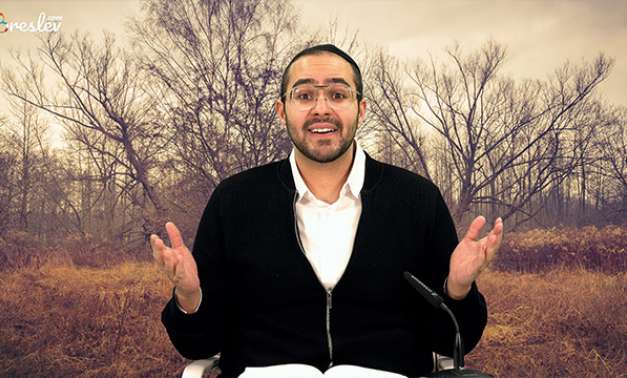
The World of Shallow Opinions
A person with a masters degree or demagogic ability is considered important and beyond criticism. People will give weight to his opinions even if he is personally corrupt…

Part 4 of “The Journey,” by Erez Moshe Doron: an elaboration of Rebbe Nachman’s famous tale of “The Rabbi and the Only Son”
He went to pour out his heart to two of his young friends.
The person who seeks true advice can only find it through his “young friends.” In other words, it is with those whose desire for spirituality is still young and active. Of course, advice can come from older people, or even from himself. The condition is that the adviser’s heart has not become old or atrophied like stone.
They advised him to journey to a particular holy man….
The question must be asked why the advice is to go to a “holy man?” One usually goes to a wise man or a sage to seek advice.
The answer is that Rabbi Nachman is alluding to a very important principle. We have already mentioned it beforehand. Knowledge without application is sterile and worthless. Knowledge which is significant and worthy of attention is practical knowledge — wisdom which can turn a person into a righteous and good human being. This is the only knowledge which ennobles and benefits the person himself as well as the whole world.
Unfortunately, what is common these days is exactly the opposite. A person who has an academic degree or some demagogic ability is immediately considered important and beyond criticism. People will give weight to his opinions even if he is personally corrupt. We mentioned as an example the professor of humanities who can give impressive lectures about ethics although he is unfaithful to his wife, swollen with pride and dishonest in business dealings. Yet, everyone will consider him important. After all, he is a professor.
Isn’t this awkward attitude towards wisdom perverted? Knowledge is a tool to serve man. If it is used for a positive purpose, then it is praiseworthy and honorable. However, wisdom which yields destruction is not suitable or estimable. Is a person who designs new and terrible technologies of mass-destruction for his own profit deserving to be honored?
Spiritual meaning can only be sought among those whose knowledge is actualized positively in their own personal lives. These are the righteous ones or holy men. It does not make sense to seek spirituality from someone whose knowledge is not anchored in the personal fulfillment of ethics. It is impossible to receive from such a person anything except a parody of the true spiritual search.
A person who seeks wisdom and who is honest with himself understands that he needs direction from someone more knowledgeable than himself. However, worthwhile guidance must be received from someone who not only is guided by his own teaching, but also one whose life is established upon firm spiritual foundations.
In our generation many people have sought far and wide for spiritual light. Many of them have fallen into the hands of charlatans or into dead-end traps. Many others, however, have been surprised to find that the spiritual light was actually close to home and the paths to it were well-traveled by their ancestors.
The treasures of Judaism, although close to the history and family background of many people, were in other respects far away. As children there was little familiarity with Judaism and scant attention was given to it. At the same time rapidly changing ideologies throughout several generations have tried to invalidate spiritual values, in general, and the rich heritage of Judaism, in particular. In most cases an immense barrier has been erected between a Jewish person and the ancient faith which calls him to the quest.
A search for spiritual meaning includes a quest for solid spiritual and intellectual roots. The fruit of the search for meaning will be self-realization. Just as the soul is the root of a person’s entire being, so spiritual consciousness is the root of his thinking and emotional set. It is natural that it should start close to home, with his family, his lineage and his people.
The teachings of Rabbi Nachman of Breslev and the spiritual heritage which has been left after him are perfect examples of the unattended treasures lying under our noses. Yet, we are prevented from undertaking a serious search through them or to test them out. The highly vaunted “openness” with which we are accustomed to praise ourselves and our culture suddenly disappears when the subject being discussed is the ethics, ideas and program of Judaism’s faith.
Many good and intelligent people have found that entering the world of Judaism is a deep and moving experience. Wholeheartedly we can suggest that it is at least worth checking out.
It is not our intention to whitewash everything called Judaism and “religious” under the title of spiritual guidance. There are many people whose Judaism is entirely external. There are many religious people whose connection to spirituality is minimal, if at all. Nevertheless, if the external face of the religious community seems to someone to be a sufficient reason not to search at all, then the motivation to begin was just not strong enough in the first place. A person must put prejudices aside. He must use a discerning eye and a sensitive heart to look for the guide who is truly spiritual and who can serve as a model for a spiritual life. There are many people who are truly spiritual and beautiful under their religious garb.
The Rabbi’s son had accomplished a mitzvah by which he had attained a spiritual level called the “minor lamp….”
The “minor lamp” is the moon. The “major lamp” is the sun. One of the significant differences between them is that the moon has no light of its own. All its light is received from the sun. Whereas it has no light of its own, the moon is like a mirror which reflects the light shined upon it.
There are some acts, like special kindnesses which a person does for someone else, that bring a person to the spiritual level of the “minor lamp.” This takes place without a person being aware of it himself. In this situation he not only feels the sense of deficiency, but he also feels a sense of constriction and a need to receive “energy” from someone else.
This state is like a person who is awake during the night. It is dark and he anxiously looks forward to the rising of the sun. He is in the dark, but at least he knows it. In the same way, a person who is on the level of the “minor lamp” still needs to evolve to a state where he has his own light to shine, but he recognizes that in order to go further he must first seek guidance from someone else. In this way he will be able to reveal his own potential and augment its growth. It will be like a young plant which has just begun to shoot. He will be able to tend to it, water it and make it grow.
What a person is able to reveal in this way is called his “good inclination.” It denotes the tendency, the desire and the inherent will of his inner being. It is the inclination to be good, to do good for others, to seek wholeness, perfection and truth, and to try to straighten the crooked.
There is another inclination which functions within a person, but in the opposite direction. The “evil inclination” compels a person towards indifference, egoism and those acts which in the end hurt a person’s body and soul as well as the society around him. Smoking or overeating are physical expressions of this inclination. The evil inclination constantly demands immediate gratifications without thought for consequences.
The Jewish sages have a graphic depiction of these two human tendencies. The good inclination is called “a poor but wise child.” The evil inclination is called “an old and foolish king.” These designations accurately depict the nature of these two opposing impulses.
Like a child, the good inclination is weak and in need of protection. He is “poor,” constantly in need of help from others. However, he knows to look upon the world and everything in it with big, wide-open eyes like a child. Everything he sees as if for the first time. He doesn’t play the know-it-all. He is not embarrassed to ask questions, and his lack of full knowledge does not upset him. Rather, he thirsts to know and understand more and more. Consequently, he is called “wise.” Openness to new thoughts and understandings, readiness to admit one’s mistakes and to change rapidly … these are the ingredients of wisdom. Without them one can never reach the goal.
The evil inclination, on the other hand, does not want to be seen as weak and vulnerable. He projects the image of being lordly and a “king.” “I know and understand everything,” he says, “I have inside information about everything.” It is very difficult for a person dominated by this inclination to hear or pay attention to anyone else, and especially when they do not concur with his opinions. It might seem that this self-assured person has the advantage over the poor child, but really that is not the case. He is “old.” The vivacious spirit of youth and renewal is not within him. He no longer has the ability to learn anything, and he cannot develop. He is closed to anything new. He cannot add to his knowledge, and it can never grow. Therefore, he is called “foolish.”
Most people like to consider themselves “In” and accepted by everyone. In general, people like to see the faults of someone else rather than their own. It might seem that such people are successful and happy, but really their personal development is atrophied and frozen.
The “minor light,” however, is in a process of revelation. He realizes that not everything which people accept is necessarily true. He understands the need for constant examination of behavior and his way of life. Only in this way can he hope to transcend the world of shallow opinions, even if this may lead to raised eyebrows all around him, even if this might cause injury to his social standing.
To be continued.
***
With sincere gratitude to www.levhadvarim.com













Tell us what you think!
Thank you for your comment!
It will be published after approval by the Editor.